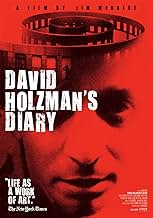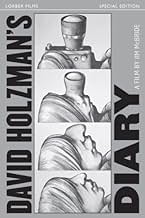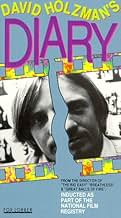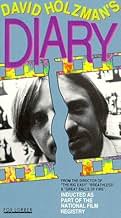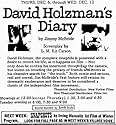VALUTAZIONE IMDb
6,5/10
1946
LA TUA VALUTAZIONE
Aggiungi una trama nella tua linguaA young filmmaker decides to make a movie of his life.A young filmmaker decides to make a movie of his life.A young filmmaker decides to make a movie of his life.
- Regia
- Sceneggiatura
- Star
- Premi
- 2 vittorie totali
Eileen Dietz
- Penny Wohl
- (as Penny Wohl)
Mike Levine
- Sandra's Boy Friend
- (as Michel Lévine)
Robert Lesser
- Max, Penny's agent
- (as Bob Lesser)
Recensioni in evidenza
If you liked the Blair Witch Project, this is where they probably got the idea. Every film school shows this as an example of a completely fictional documentary, that works. Done in cinema verite style, the fictional angst filled life of a documentary maker falls apart, as he chronicles its disintegration, largely caused by his obsession with filming it as it crumbles. Like watching a train wreck.
Mock cinema vertite about a young filmmakers consternation at finding 'truth' and putting it on film. Insightfully examines how we define reality, how our perceptions can cloud it, and whether it is really possible to show it on film. Probably to talky for most, but still quite thought provoking. Filled with some really offbeat ideas and camerawork. Among them: filming the faces of people at a bus stop while we hear excerpts from the McCarthy hearings. Also photographing a entire night of tv viewing each minute and then playing them back frame by frame. A very low budget movie, made by some very young filmmakers, with a very original point of view.
Wildly unconventional and sadly underrated, "David Holzman's Diary" is, in my opinion, the greatest "found footage" film ever made. While "found footage" is a genre normally associated only with horror movies, and wasn't even a term in 1967, this still plays out extraordinarily similarly to a film like "The Visit" or "Willow Creek". However, it is much, much better and is a tragicomedy rather than a horror flick.
Before delving into the depths of this obscure oddity, one must be aware that it is a highly satirical film. It mocks the avant garde and cinema verite movement in a deadpan and, at times, subtle way. It portrays those who attempted to find art and truth in the painfully mundane as people who are pretentious, delusional, and occasionally creepy. Of course, I am something of a fan of these movements, but it is important to also note that the film isn't mocking ALL cinema verite or experimental films, just the highly pretentious and annoyingly boring ones that began to spring up back in the mid to late 60's.
Although he is something of an antihero, the film also gives poor David Holzman some sympathy as we witness his life steadily decay due to his cinematic obsession. It's tragic, it's satiric, and it's comic.
Before delving into the depths of this obscure oddity, one must be aware that it is a highly satirical film. It mocks the avant garde and cinema verite movement in a deadpan and, at times, subtle way. It portrays those who attempted to find art and truth in the painfully mundane as people who are pretentious, delusional, and occasionally creepy. Of course, I am something of a fan of these movements, but it is important to also note that the film isn't mocking ALL cinema verite or experimental films, just the highly pretentious and annoyingly boring ones that began to spring up back in the mid to late 60's.
Although he is something of an antihero, the film also gives poor David Holzman some sympathy as we witness his life steadily decay due to his cinematic obsession. It's tragic, it's satiric, and it's comic.
Kit Carson's face has a relevancy even today, cutting through the demographic piece of the cake: he reminds one of Jean Pierre Leaud which is arguably one of the motives casting him as David Holzman, and he also reminds one of us today Beck's face, and his maybe signature lyric "I'm a loser baby, so why don't you kill me."
But David Holzman as his name says is a man holding - holding what? A camera for sure, the instrument that ultimately makes him fall apart; pursuing his credo stated right at the beginning and maybe, uneasily, hilariously put to the test for the rest of it, that is Jean-Luc Godard's phrase that the cinematic truth runs 24 times a frame. I liked the fact that he rises a bit his voice and somehow overacts his name with an American accent as if it was not far away from jeans, luck, God and art.
I admit I expected something closer to the "I do this, I do that" poetic compositions Frank O'Hara was doing a bit earlier the same period, for he too queered and mocked supposedly avant-guard procedures, or at least their seriousness. I thought David Holzman's self-indulgence slightly needed the more constant alertness he exemplified in scenes like the one in the park, with rows of old people on benches and a dubious voice-over international commentary - that broke away from the rather one-dimensional reaction poor Penny has and seems that she conceives her late boyfriend a simple stupid stalker.
For me the anthology scene is the one with David's friend who talks on camera theorizing about film, in front of a pop mural at his place - and when you think the way the tableau conveys it that you are about to have an illumination on Rosenquist and his tableaux and the American predicament or what, David's friend moves and goes back to the wall resting his head on the crotch on the figure behind. This is great sophisticated camp.
And for me it echoes finely when the end comes with an unexpected intuition on the other side of the pitch: in the end David Holzman says he would not have done it; the 24-times truth seems to him something close to Bartleby territory. "I would prefer not to". Not to do it he says, but this, exactly, seems to me a grim acceptance of the American predicament. What I mean by this is that Bartleby never says "not to do it", nothing comes after his "not to," his denial is a formal gesture without content, that is why his presence is so unbearable. David is not Bartleby but he stumbles upon his presence, perhaps the way Zapruder stumbled upon a President's assassination some years back in his own brand of home cinema verite, and this is what troubles David and makes the film something else than a diary.
But David Holzman as his name says is a man holding - holding what? A camera for sure, the instrument that ultimately makes him fall apart; pursuing his credo stated right at the beginning and maybe, uneasily, hilariously put to the test for the rest of it, that is Jean-Luc Godard's phrase that the cinematic truth runs 24 times a frame. I liked the fact that he rises a bit his voice and somehow overacts his name with an American accent as if it was not far away from jeans, luck, God and art.
I admit I expected something closer to the "I do this, I do that" poetic compositions Frank O'Hara was doing a bit earlier the same period, for he too queered and mocked supposedly avant-guard procedures, or at least their seriousness. I thought David Holzman's self-indulgence slightly needed the more constant alertness he exemplified in scenes like the one in the park, with rows of old people on benches and a dubious voice-over international commentary - that broke away from the rather one-dimensional reaction poor Penny has and seems that she conceives her late boyfriend a simple stupid stalker.
For me the anthology scene is the one with David's friend who talks on camera theorizing about film, in front of a pop mural at his place - and when you think the way the tableau conveys it that you are about to have an illumination on Rosenquist and his tableaux and the American predicament or what, David's friend moves and goes back to the wall resting his head on the crotch on the figure behind. This is great sophisticated camp.
And for me it echoes finely when the end comes with an unexpected intuition on the other side of the pitch: in the end David Holzman says he would not have done it; the 24-times truth seems to him something close to Bartleby territory. "I would prefer not to". Not to do it he says, but this, exactly, seems to me a grim acceptance of the American predicament. What I mean by this is that Bartleby never says "not to do it", nothing comes after his "not to," his denial is a formal gesture without content, that is why his presence is so unbearable. David is not Bartleby but he stumbles upon his presence, perhaps the way Zapruder stumbled upon a President's assassination some years back in his own brand of home cinema verite, and this is what troubles David and makes the film something else than a diary.
Jim McBride's mockumentary is a delightful satire about the filmmaker's compulsion to capture everything on camera, and also a wry character study of one young man who uses his "art" as a pretext for complete self-absorption. This film from the sixties eerily forecasts our present absorption with social media.
As played by L.M. Kit Carson, David is on an irreconcilable mission: to at once understand a world in chaos, and cocoon himself from it in his own cinematic world.
He is lucky that his girlfriend ( Eileen Dietz) didn't chuck his camera when he filmed her sleeping nude.
One thing I found fascinating is the "Observer Effect" as defined by David. Once you start filming, you cease to have reality as you change in response to the film. It is not real life, it is a movie. One would wonder here, if you wore a GoPro Hero all day would you record a normal day, or would you look for the abnormal?
With irritation, alienation, a sex-hungry lady sitting in a car in the middle of traffic, and a few bloody noses, this one "Diary" worth peeking into.
As played by L.M. Kit Carson, David is on an irreconcilable mission: to at once understand a world in chaos, and cocoon himself from it in his own cinematic world.
He is lucky that his girlfriend ( Eileen Dietz) didn't chuck his camera when he filmed her sleeping nude.
One thing I found fascinating is the "Observer Effect" as defined by David. Once you start filming, you cease to have reality as you change in response to the film. It is not real life, it is a movie. One would wonder here, if you wore a GoPro Hero all day would you record a normal day, or would you look for the abnormal?
With irritation, alienation, a sex-hungry lady sitting in a car in the middle of traffic, and a few bloody noses, this one "Diary" worth peeking into.
Lo sapevi?
- QuizShot on a budget of only $2,500.
- BlooperHolzman shows a montage of TV he says he watched on a Tuesday night in July 1967. He was wrong about the night. Although it's hard to date the Huntley/Brinkley Report newscast or the Joey Bishop Show late-night talk show, neither Batman, Star Trek or the Dean Martin Show aired on a Tuesday night. In July 1967, Batman aired on Wednesday and Thursday nights and Star Trek and the Dean Martin Show aired on Thursday nights. The montage is from a Thursday night.
- Citazioni
David Holzman: It was like rooms everything is so perfect, that everything is so perfect that they have to be kept, that because this random particular accidental state so meaningful, so, so touching, it's so touching, it's so beautiful.
- ConnessioniEdited into 365 days, also known as a Year (2019)
I più visti
Accedi per valutare e creare un elenco di titoli salvati per ottenere consigli personalizzati
- How long is David Holzman's Diary?Powered by Alexa
Dettagli
- Data di uscita
- Paese di origine
- Lingua
- Celebre anche come
- David Holzmans Tagebuch
- Luoghi delle riprese
- Vedi altri crediti dell’azienda su IMDbPro
- Tempo di esecuzione1 ora 14 minuti
- Colore
- Mix di suoni
- Proporzioni
- 1.37 : 1
Contribuisci a questa pagina
Suggerisci una modifica o aggiungi i contenuti mancanti

Divario superiore
By what name was David Holzman's Diary (1967) officially released in India in English?
Rispondi

